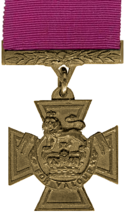Montague Shadworth Seymour Moore
Montague Shadworth Seymour Moore | |
|---|---|
 | |
| Born | 9 October 1896 Worthing, Sussex, United Kingdom |
| Died | 12 September 1966 (aged 69) Kiganjo, Kenya |
| Allegiance | |
| Service/ | |
| Rank | Major |
| Unit | Hampshire Regiment King's African Rifles |
| Battles/wars | World War I Russian Civil War |
| Awards | Victoria Cross Croix de Guerre (France) |
Montague Shadworth Seymour Moore VC (9 October 1896 – 12 September 1966) was an English recipient of the Victoria Cross, the highest and most prestigious award for gallantry in the face of the enemy that can be awarded to British and Commonwealth forces.
Early life
Born at 13 Montague Place, WORTHING, he attended Bedford School from 1906 to 1913.
Details
He was 20 years old, and a Second Lieutenant in the 15th Bn., The Hampshire Regiment (later the Royal Hampshire Regiment), British Army during the First World War when the following deed took place for which he was awarded the VC.
On 20 September 1917 near Tower Hamlets, east of Ypres, Belgium, Second Lieutenant Moore volunteered to make a fresh attack on a final objective and went forward with some 70 men, but they met such heavy opposition that when he arrived at his objective he had only one sergeant and four men. Nothing daunted he at once bombed a large dug-out, taking 28 prisoners, two machine-guns and a light field-gun. Gradually more officers and men arrived, numbering about 60 and he held the post for 36 hours beating off counter-attacks, until his force was reduced to 10 men. He eventually got away his wounded and withdrew under cover of thick mist.[1]
He later achieved the rank of Major.
References
- ^ "No. 30372". The London Gazette (invalid
|supp=(help)). 8 November 1917.
- Monuments to Courage (David Harvey, 1999)
- The Register of the Victoria Cross (This England, 1997)
- VCs of the First World War - Passchendaele 1917 (Stephen Snelling, 1998)
- Use dmy dates from April 2012
- 1896 births
- 1966 deaths
- British Army personnel of World War I
- Royal Hampshire Regiment officers
- British World War I recipients of the Victoria Cross
- People educated at Bedford School
- People from Worthing
- Recipients of the Croix de guerre 1914–1918 (France)
- British Army recipients of the Victoria Cross
- King's African Rifles officers
- British Army personnel of the Russian Civil War
